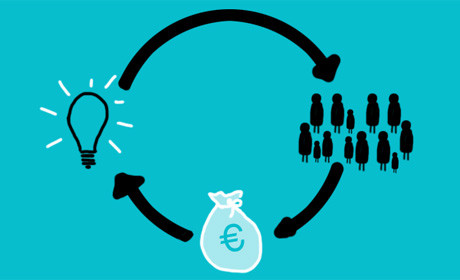
"We see a big problem in the media, because I think people still haven't figured out the right model for journalism in the digital age," Seung-yoon Lee, chief executive and co-founder of Byline, told Journalism.co.uk.
To address this issue, Lee and his colleague Daniel Tudor have founded Byline, a "one-stop crowdfunding and media outlet platform where journalists and quality bloggers reach readers directly".
Launched in April, Byline is today releasing the final beta version of its website.I think native advertising seriously undermines the credibility of newspapersSeung-yoon Lee, Byline
The platform has two new features: the Supporters' Cafe, an online space where readers can interact with journalists, and Milestone Goals, a way for writers to receive funding in stages if they are working on an investigative journalism project.
When it comes to business models in journalism, native advertising and paywalls aren't a guaranteed recipe for success, as people are increasingly either using ad blocking software or unwilling to pay for the entire content of a newspaper.
Which is why Byline's approach is to "break it down to the journalist", said Lee. On Byline, there is no editor – journalists pitch an article or topic directly to their readers and they can choose whether they want to do a regular column or an 'exclusive'.
"Mixing advertising and editorial has become the cheap business model, but I think native advertising seriously undermines the credibility of newspapers," Lee argued.
At the moment, Byline is invitation-only and handpicks its writers, but as the platform moves forward from its beta stage in the next months, it will be open to anyone who has a story to contribute.
Journalists who write a Byline column can decide how often they want to post and they are paid by readers either per article or per month.
Introductory video showing how Byline works
Lee said a column is a more suitable option for bloggers who want to tackle a niche subject, cross-post from their existing blogs to get more exposure or even try to make Byline a main source of income.
Readers can access the columns for free, but if they decide to give money, they are offered some perks that journalists set up themselves.
These interaction opportunities can include anything from a discussion with the journalist in the Supporters' Cafe, to the chance of going along on an investigative trip with the writer or even something as simple as a Reddit AMA (Ask Me Anything).
If journalists choose to do an 'exclusive' – an investigative project on a larger scale – with a set budget, they will not receive any money until the funding target has been reached.
However, by setting Milestone Goals for their project, they can receive funding in stages. This would enable journalists to cover any upfront costs at the beginning of their investigation and keep readers updated on their progress.
"We have to find the right model for each journalist to get funded, because once we have the volume, then it becomes a proper marketplace," Lee said.
Some of the journalists who have published their work on Byline include feminist writer Julie Bindel, who raised £6,500 to investigate global sex trade and Guardian columnist Alex Andreou, who wrote columns about the Greek crisis.
Byline also did an investigation with Bellingcat, looking at the case of an allegedly corrupt police officer in the News International phone hacking scandal.
Crowdfunding is becoming the business model of choice for many smaller news outlets, particularly those focusing on investigative journalism, but just asking readers to donate isn't enough.
The Ferret, which recently launched in Scotland, asked people to vote on the topic of its first investigation, before opening it up for crowdfunding. Lee explained that Byline gives journalists the freedom to "establish a relationship" with their readers.People don't crowdfund articles to read them among themselves, what they want is to spread them around the world and increase the journalist's voiceSeung-yoon Lee, Byline
It is up to them whether or not they want to post other work or relevant material before the crowdfunding target for their investigative project has been reached.
And according to Lee, writers don't come to Byline to "shop projects, like they do on Amazon or Kickstarter".
Byline's main aim is not to be just a crowdfunding platform, but rather a "media company that happens to use crowdfunding as a business model".
"People don't crowdfund articles to read them among themselves, what they want is to spread them around the world and increase the journalist's voice."
Free daily newsletter
If you like our news and feature articles, you can sign up to receive our free daily (Mon-Fri) email newsletter (mobile friendly).
Related articles
- Abbianca Nassar: 'What I learned from running an online investigative journalism outlet'
- 21 OSINT browser extensions to help your investigations
- Black Ballad hits a decade: 'Our priority will always be our community'
- 'I asked myself – why is he going public?': working with a Big Tobacco whistleblower
- How The Bureau of Investigative Journalism is reporting on the link between Big Tech and governments











